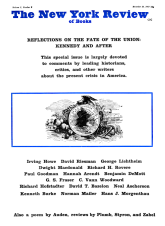Man has an inveterate tendency to personalize history and to attribute to the “great men” unique and irreplaceable qualities. When Roosevelt died in April, 1945, we thought it was the end of the world. Eisenhower rode to office in 1953 on the slogan “It’s time for a change,” and when Kennedy assumed the Presidency in 1961, we thought that now everything would be different. However, it is very doubtful whether American politics would have been substantially different had Roosevelt lived out his fourth term. The administrations of Truman, Eisenhower, and Kennedy were indeed radically different in style because the style of an administration is of necessity the extension of the Chief Executive’s personality. But where are the differences in the substance of policy. There was nothing new in the “new look” of Eisenhower’s foreign policy but Mr. Dulles’s slogans, and the “new frontier” contributed more to political literature than to political action.
In truth, the conditions of modern life impose narrow limits upon the initiative of statesmen. While a revolutionary genius may be able to transform the political environment, an American President, operating within an established constitutional and political tradition, may accelerate or slow down or at best deflect, but cannot radically alter, the course of events.
Thus it is very unlikely that the assassination of President Kennedy will by itself have a profound impact upon American politics at home and abroad. The style of government is bound to be different from what it was, since Johnson’s personality is different from Kennedy’s. In the field of foreign policy, it is difficult to see what initiatives a Johnson Administration would take that Kennedy’s Administration did not take. Or, to put it the other way around, the Kennedy Administration, with all its intellectual brilliance and openness to ideas, was incapable of real innovation, and a Johnson Administration is not likely to do any better, short of its hand being forced by events beyond its control.
As for the two main domestic issues the present Administration has inherited from its predecessor—race relations and the economy—President Johnson has a better chance than his predecessor to get a satisfactory civil rights bill through Congress. First of all, he has proved his skill as a manipulator of politicians; secondly, he is a Southerner himself; and thirdly, in order to be nominated and elected in 1964, he is under an irresistible compulsion to make a record which can pass liberal scrutiny.
In the sphere of economics, President Johnson is not likely to do better than his predecessor. Kennedy did not grasp the significance of the structural changes the American economy is undergoing, which require more radical remedies than Keynesian measures can provide, and there is no reason to suppose that Johnson will. As for the overriding issue facing American democracy, which has stood in the way of the adaptation of American society to new conditions at home and abroad, only a miracle can transform President Johnson into the emancipator from the dead weight of Southern feudalism.
But then, the irresistible impact of events on the conscience and will of men has wrought miracles before. And it is in the nature of miracles that one can hope and pray for them, but there is nothing one can do to bring them about.
This Issue
December 26, 1963



